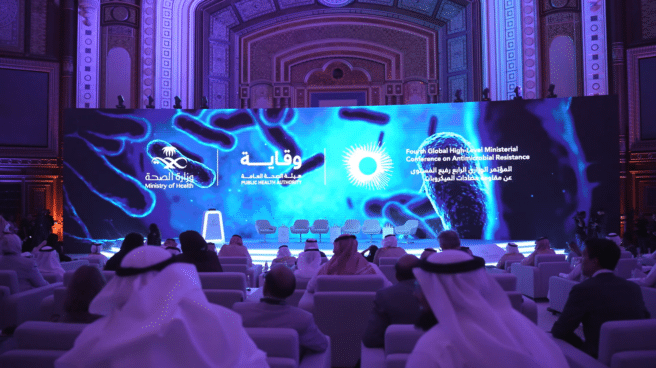In a key gathering that underscores the urgency of addressing one of humanity's most pressing health challenges, Saudi Arabia is hosting the Fourth High-Level Ministerial Meeting on Antimicrobial Resistance (AMR), bringing together global health leaders and experts from around the world to combat what experts are calling a 'silent pandemic.'
The gravity of the situation is stark: antimicrobial resistance currently claims 1.14 million lives annually, with projections indicating potential casualties of up to 39 million by 2050 if immediate action isn't taken. Against this backdrop, Saudi Arabia is leading a crucial international dialogue aimed at strengthening the global response to this escalating crisis.
"AMR threatens people of all ages, impacting human, animal, and plant health, environment, and food security," stated Saudi Health Minister Fahad Al-Jalajel during the opening session. "To successfully contain AMR, we must adopt a comprehensive One Health approach that systematically addresses the obstacles hindering progress."
“Antimicrobial resistance represents a serious threat to global public health, and we look forward to working with anyone, anywhere to take on the challenge of eliminating AMR. We must build on current partnerships and forge new alliances to secure the health, safety, environment and economic development the world needs.” The Saudi Minister of Health, concluded
The meeting marks a significant milestone in the global fight against AMR, with Saudi Arabia set to announce three groundbreaking initiatives. Dr. Abdullah Assiri, Assistant Deputy Minister for Preventive Health, revealed that these initiatives will address pressing AMR issues within a tangible timeframe, complete with monitoring and evaluation processes.
The meeting's comprehensive approach addresses multiple sectors, as explained by Dr. Mohammed bin Khalid Al-Abd Al-Aali, Assistant Minister of Health: "The One Health approach brings human health, agriculture, animal health, and environment all together. The leaders from the member states represent all these domains, sharing ideas and tackling this complex issue."
WHO Director-General Dr. Tedros Adhanom Ghebreyesus emphasized the immediate nature of the threat: "Antimicrobial resistance is not a risk for the future; it is here and now, making many antibiotics and other medicines on which we depend less effective, and making routine infections harder to treat, debilitating or deadly."
The economic stakes are equally compelling. According to Dr. Hanan Balkhy, WHO Regional Director for the Eastern Mediterranean, effective action could save $99 billion annually in healthcare costs by 2025 and potentially expand the global economy by $990 billion by 2050. However, the challenges are substantial - developing a new antibiotic takes approximately 10 years and costs $1.2 billion, yet bacterial resistance can render these antibiotics ineffective in just two years.
Environmental factors play a crucial role in the spread of AMR, as highlighted by UNEP Executive Director Inger Andersen: "The Jeddah Declaration calls for immediate action to protect the environment as part of our AMR response." She emphasized the need for reduced effluents and waste from pharmaceutical production, agrifood, healthcare facilities, and municipal systems.
The gathering builds upon previous global initiatives, including the 2016 UN General Assembly Political Declaration on AMR and the recent Muscat Manifesto. With proper intervention, experts project the prevention of 92 million deaths by 2050 through improved healthcare and equitable access to antibiotics.
As the conference continues, global leaders are working to forge a strengthened common roadmap with clear deliverables to counter the rise in drug resistance. The outcomes of this high-level meeting are expected to shape the international community's response to AMR for years to come, with Saudi Arabia playing a pivotal role in driving this crucial global health agenda forward.
As the conference continues, global leaders are working to forge a strengthened common roadmap with clear deliverables to counter the rise in drug resistance. Saudi Arabia's leadership in hosting this crucial ministerial meeting demonstrates the Kingdom's growing influence in shaping global health policy and its commitment to addressing worldwide health challenges.
Under Vision 2030, the Kingdom has consistently expanded its role in international healthcare initiatives, with the AMR conference in Jeddah marking another significant milestone in this journey. Through its strategic position bridging East and West, substantial healthcare infrastructure, and demonstrated commitment to global health security, Saudi Arabia is emerging as a key architect in the international fight against antimicrobial resistance.
Lo más visto
- 1 Peinado llega a la Moncloa para tomarle declaración a Bolaños
- 2 El ejército español se reincorpora a las mayores maniobras en África pero evita Marruecos
- 3 Sanidad ordena retirar varias sopas y caldos de los supermercados
- 4 La "decadencia intelectual" de Mario Vargas Llosa: "Fue perdiendo la memoria"
- 5 La Promesa: avance del capítulo 579 el próximo lunes 21 de abril
- 6 La Promesa: RTVE confirma la duración de la última temporada
- 7 El juez Peinado multa a Vox y Hazte Oír con 500 euros y al abogado de Begoña Gómez con 5.000
- 8 Los pensionistas que recibirán en el mes de abril 140 euros extra
- 9 La abeja robot o cómo la realidad supera a 'Black Mirror'
